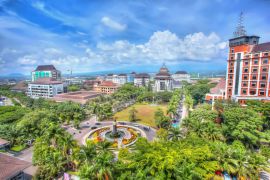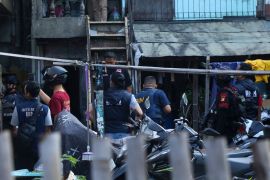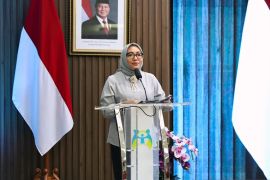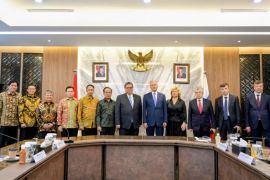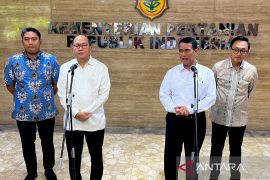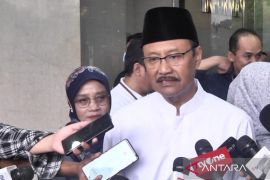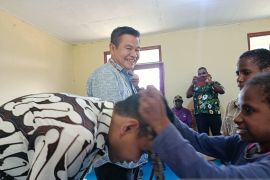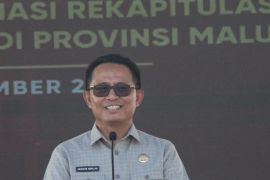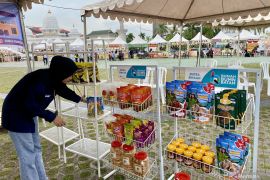The delegates are attending the 12th London-based International Institute for Strategic Studies (IISS) Asia Security Summit, which is convened by Singapre,
Also called the Shangri-La Dialogue, the event is a key forum for discussions and analysis of defence and security issues in the region and beyond.
Prime Minister Nguyen Tan Dung is the fifth head of government/state other than Singapore making the keynote speech at the summit, followed by Australian Prime Minister Kevin Rudd at Shangri-La Dialogue 2009, RoK President Lee Myung-bak in 2010, Malaysian Prime Minister Najib Razak in 2011 and Indonesian President Susilo Bambang Yudhoyono last year.
In his keynote speech at the opening of the annual security meeting, Mr Dung said countries - big or small - need to build strategic trust to deepen and maintain peace and stability in the Asia-Pacific region.
To reinforce regional trust, he said countries have to abide by international law, be aware of their responsibilities and strengthen formal groupings or networks that can lead to better cooperation.
He said the US and China have `the biggest responsibilities` in the world and urged both major powers to work together to forge peace and stability in the region.
"What is important is that such expectation should be reinforced by strategic trust and... reflected by concrete and constructive actions of these nations," he added.
PM Dung stressed on economy and security in Asia, which is a dynamic , increasingly integrated, rising and successful region. On the other hand, it is a dysfunctional region with rising nationalism, escalating territorial disputes and distrust among the key players.
As the two dominant players, the relationship between the US , the largest economy in the world, and China, the second largest world economy shape security in Asia. If their rivalry escalates, countries in Asia could drift into bipolarity and indeed the dynamics of economic development in the region would be affected.
Indonesia as a G20 country and this year hosts the APEC summit has given its perspective to set the stage for a very special debate on regional security trends at last year's Shangri-La Dialogue.
DR. Connie Rahakundini Bakrie, Institute of Defense and Security Studies Executive Director, says there is a basic principle of what President Yudhoyono delivered last year at the summit compared with PM Dung.
"Yudhoyono`s statement shows us that he is very optimistic that this region will achieve this dynamic equilibrium since he also believes we are living at a time when nations are experiencing major realignment of interests," she said.
"That is why President Yudhoyono thinks the nation in the South East Asian region does not compete since he thinks there is no rivalry."
The Indonesian leader especially underlined that Aceh and tsunami had brought military to military to work together to save lives.
According to her, Mr Dung underlined this by his calling for greater strategic trust in the Asia-Pacific region, arguing that simmering tension and the territorial disputes of recent years threatened the region`s prosperity.
"I think what Prime Minister Nguyen Tan Dung said is really true since we believe that this region will soon fall into instability and especially, armed conflicts," DR. Bakrie said.
Mr Dung underlined heightened tensions in the region over maritime disputes in the East and South China Seas, North Korea`s nuclear ambition, as well as growing friction between neighbors like China and Japan.
As for the ongoing disputes in South China Sea and the Korean Peninsula, the prime minister expressed confidence that both ASEAN and China would be able to work together on a mechanism to ensure maritime security and freedom navigation in the region, and to create conditions for settling the disputes.
"Martime transport and communications are growing in scale and acquiring a much greater significance. It is projected that three-quarters of global trade will be made via marine routes and two-thirds of that will be shipped across the East Sea," he said.
According to him, a single irresponsible action or instigation of conflict could well lead to the interruption of these trade flows, with unforeseeable consequences - not only to regional economies but also to the entire world.
DR. Bakrie, a lecturer at the University of Indonesia, argues that Indonesia has to pay a serious attention on how these tensions actually drive the mini security alignment by each country including the involvement of Australia and India into the picture, meaning Indonesia definitely has to increase its Navy and Air Force capabilities to protect its own waters and resources due to the well known illegal acts on its waters related to food and energy securities in the near future.
"If we read the last report by US political expert Lex Reiffer last week who said that Asia is actually the biggest threat of world peace in the coming years, and therefore he said that the US pivot its all about," she said.
Also Reiffer underlined that Indonesia would be a new problem for this region if the country didn`t pay attention to its resource scarcity.
"I think then we should really concentrate on what this resource hunger can be a threat that damage ASEAN unity in the long run," she said.
Therefore she believes Indonesia foreign policy has to shift a little more to "the real non alignment policy" which can drive the policy of deepening its security relations, in a more concrete way, both with China and US alliances countries especially Australia.
"Since we are the most strategic nation in ASEAN who actually really hold `the heart` of regional waters with our strategic SLOCs. SLOC in time of peace its important for trades but in time of tension will be a very strategic assets for military," she said.
According to her, the concept of new strategic culture that President Yudhoyono said must also be driven by win-win mindset, rather than win-lose predisposition.
DR. Bakrie says it is easy to say but quite hard to achieve when it comes to a realist way of thinking that the resource issues on the region will drive more into rivals instead of partner.
Indonesia, Vietnam and other countries have given their perspectives to set the stage for a very special debate on regional security trends at the summit. The Shangri-La Dialogue, in its 12th year, continues to serve as the best available vehicle in the Asia-Pacific for developing and channeling astute and effective public policy on defence and security.
Reporter: Mohammad Anthoni
Editor: Aditia Maruli Radja
Copyright © ANTARA 2013
